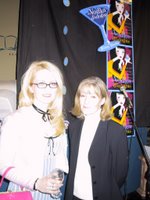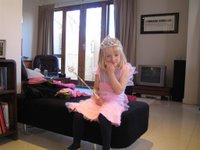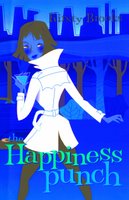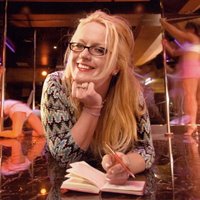How I became a writer (and got published along the way)
A few years ago I decided my central character needed to learn self-defence so I made sure her trainer was a big burly bouncer-type guy named Mince. Their dialogue together was really fun to write because despite the fact that they were such different people, they kind of respected each other, even though she gets knocked out a bit, and isn’t all that great at fighting.
But writing fiction is really a whole hell of a lot more than just making stuff up. I’m also writing to entertain myself and I have to keep that objective in mind the whole time. It sounds entirely selfish, and I guess it is, but it’s also the central objective to my writing and if I don’t entertain myself, then I’ve failed to do my job. If I’m bored, or confused, or unconvinced by the story, then the story just won’t work for the reader, either. If I don’t like the story, I can’t expect other readers to either. That’s the thing, you tend to just be better at what you enjoy, and enjoy what you’re good at.
I believe very strongly that if you don’t entertain the reader, then they won’t keep reading and whatever you want to get across is lost as well. I guess the message I wanted to tell in my search for Cassidy's friend/protector/self defence instructor, is not to get in a fistfight with a guy whose nickname has anything to do with hamburger meat.

I have been writing for a long time, more than ten years, but it’s only in the past few years that I feel that I’ve found the voice and style I want to work in. I started writing in this style when I couldn’t find the sort of book I wanted to read and I’d already read the ones I loved a few times. I decided to write one that might satisfy me, and therefore came up with all the elements of story and characters and setting that I enjoyed.
So I work for myself in three capacities. I write, both creatively and professionally, and I also run an assessment and editing service for other writers (Driftwood Manuscripts). I have around fifty people contracted to me who are specialists in different writing genres, such as children’s books, science fiction, romance, autobiographies, etc, and I send them the manuscripts my clients have finished. These assessors are all experts in the various fields and so they read the manuscripts that the client is hoping to get published and then they write reports evaluating them.
I used the service myself on my first novel, LADY LUCK, long before I ran the company, when it was an odd little book called 'Squint' with five central viewpoint character interacting in what I'd call a grunge-style thriller, low on thrills, however. I soon changed that, though. Getting feedback on the manuscript was incredibly useful and ultimately led to me rewriting the entire manuscript from scratch because I have always found writing far easier than editing. I ended up with only one viewpoint character (Phoebe) and I just tried to make it more light-hearted in order to keep my own interest in the work. It is a principle I still use and I loved it enought o wake up at 5am every day to work on it.
I run this service, write novels and also do what I call professional writing, which involves different things like writing and creating boards games (For example, I wrote the board games for the television shows, Big Brother and Popstars), other times I might be working on reviews, articles, running writing and publishing workshops or taking lectures.
And now, especially with two deadlines looming, I tend to live a little through my fictional characters. I send them out on adventures or out for a drink, and I give them nice clothes, good friends, exciting lives, excellent relationships, dreadful confrontations, courage, ambition, humour, quick thinking; all the things I love, and at times wicsh I had, or was doing myself.
I’ve also been doing it in various forms for most of my life. The world never seemed to fit the way I thought it should, but in my imagination, I changed all that.
My parents used to take my sister and I on wonderful long driving holidays around Australia. I remember one of my best memories was waking up with my face squished against the glass in the back seat and seeing my dad walking back from the petrol station with ice-creams.
I’m still a big fan of ice-cream, driving holidays, my family and sleeping, but also of the daydreams I’d have while they were driving.
I’d spend hours dreaming up these stories where my boyfriend always looked suspiciously like someone from my favourite band at the time, and I looked like Olivia Newton John in Xanadu. Mostly I was also a superhero with a few, subtle super powers that I used for good deeds, but the specific details of these scenarios were endlessly varied.
I’d have adventures like in the Trixie Beldon books or the Secret Seven series and I’d always solve crime with my wits and good humour, and my super powers, and then I’d be wise and worldly and inherently cool, all the things that I’m not. It really was excellent and it seems very little has changed.
I was lucky with the Cassidy Blair series, starting with THE VODKA DIALOGUE, because I loved writing these stories, but also it seemed other people liked reading them, and I now have a great mailing list of readers who’ve sent me letters and emails telling me what they like about the books. I love this, because it also helps me see what is (and isn’t) working. But as well as a chunk of good luck, I also worked very hard and did a fair bit of research to back up my ideas to make sure I got it right. I came up with a concept of some books that I wanted to read and therefore could write, and I felt really strongly that there was a market for fun, light-hearted, adventure stories with a strong element of crime and romance. Ultimately, I wanted to share what i loved about life, and the world, with others, so I wanted to make sure it was as entertaining as possible. With this goal in mind, I actually found my own style, a type of book i loved to write, so it worked out well. I would never recommend someone write for the sole goal of getting published, this goal can destroy the joy of the words and the scenes and characters within it, but to keep in mind the audience can make sure you write to your best abilities, to make sure the story you want to write is one that others want to read. This mix worked for me.
I had some of the central characters in my head for a long time; I was convinced by them, and I knew what they wanted and needed, which are, in fiction as in life, not always the same thing.
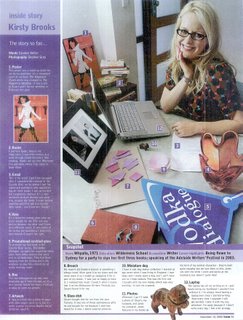
I had my first novel, a comedy romance crime book called LADY LUCK, bought by Wakefield Press in 2001 and will be finishing the sequel to that, called BOSSY BOOTS, soon. I love working with Wakefield because they do terrific covers, promotion and editing and have a really good philosophy of publishing local product as well as promoting this interstate and overseas.
I am also a strong advocate for the development of local creative artists and industry, and while I set my books in Adelaide and live and work here, I travel interstate a fair bit, because many people I work with are there. So the success of LADY LUCK gave me some confidence that there might be a market for more books in this genre. Around this time last year I took the three-book concept to my agent, Jenny Darling, who I’m relieved to say, liked it as well.
So I kept writing and then suddenly I only had a month or two until the Frankfurt Bookfair and I had to send the manuscript off to the five editors before they got on the plane, so I was editing all night, not sleeping, getting up at five in the morning and drinking a lot of coffee and diet Pepsi.
I was in the process of trying to find somewhere to live, and was staying at my parents’ place. They were incredibly patient with me stumbling around at night while working, wearing some strange combination of clothes, because Stirling is a very, very cold place in August. And I sent it off the night before those editors were all flying out of the country, it was a very close call and I don’t recommend that sort of editing process to anyone.
And then Jenny rang to say that the publishing director at Hodder (now Hachette Livre) liked the book and the concept for the series. It was like a dream. While I was talking to Jenny, however, I had to find a piece of paper and pen and write down everything she was said because there was also a good chance I had been working too hard and too late at night and was just hallucinating. Then the amazing people at Hodder flew me to Sydney, laughed at all my lame jokes, send me a box of books and e-mailed me a variety of cover ideas to feed my depleted ego.
So my advice to other writers hoping to get published is to find what you want to read, develop stories and characters that you feel emotionally involved with, and write a book like that. When you’ve written something you love, do some more research into the genre, what the expectations are.
Making stuff up for a living is really nice and I highly recommend it. I hope other writers out there might share their stories and find inspiration and information on this blog site. When I was younger I never thought I could be a creative writer myself, I didn’t know it was a career choice but I'm very glad it is. I know I‘m lucky and I hope my experiences encourage other writers as well.
Listening to: The Orb ‘Little Fluffy Clouds’
Eating: Cheese and toast
Thinking about: Running through a sprinkler - it’s hot in Adelaide today
Watching: My bird Jones with his head tucked into his feathers, sleeping peacefully next to my computer
Wearing: Surprisingly comfortable undies
Reading: Patricia Cornwell’s ‘Cause of Death’
